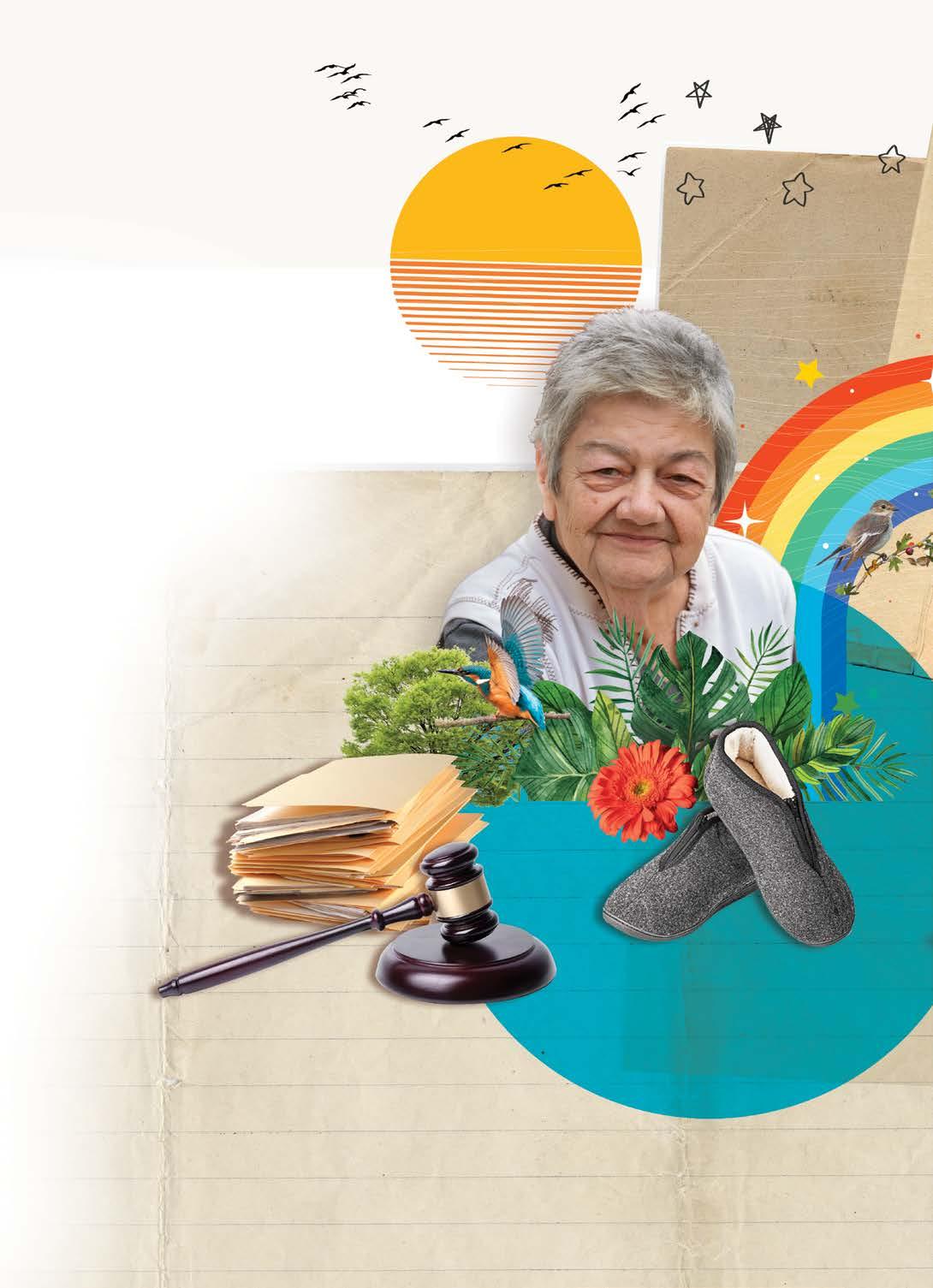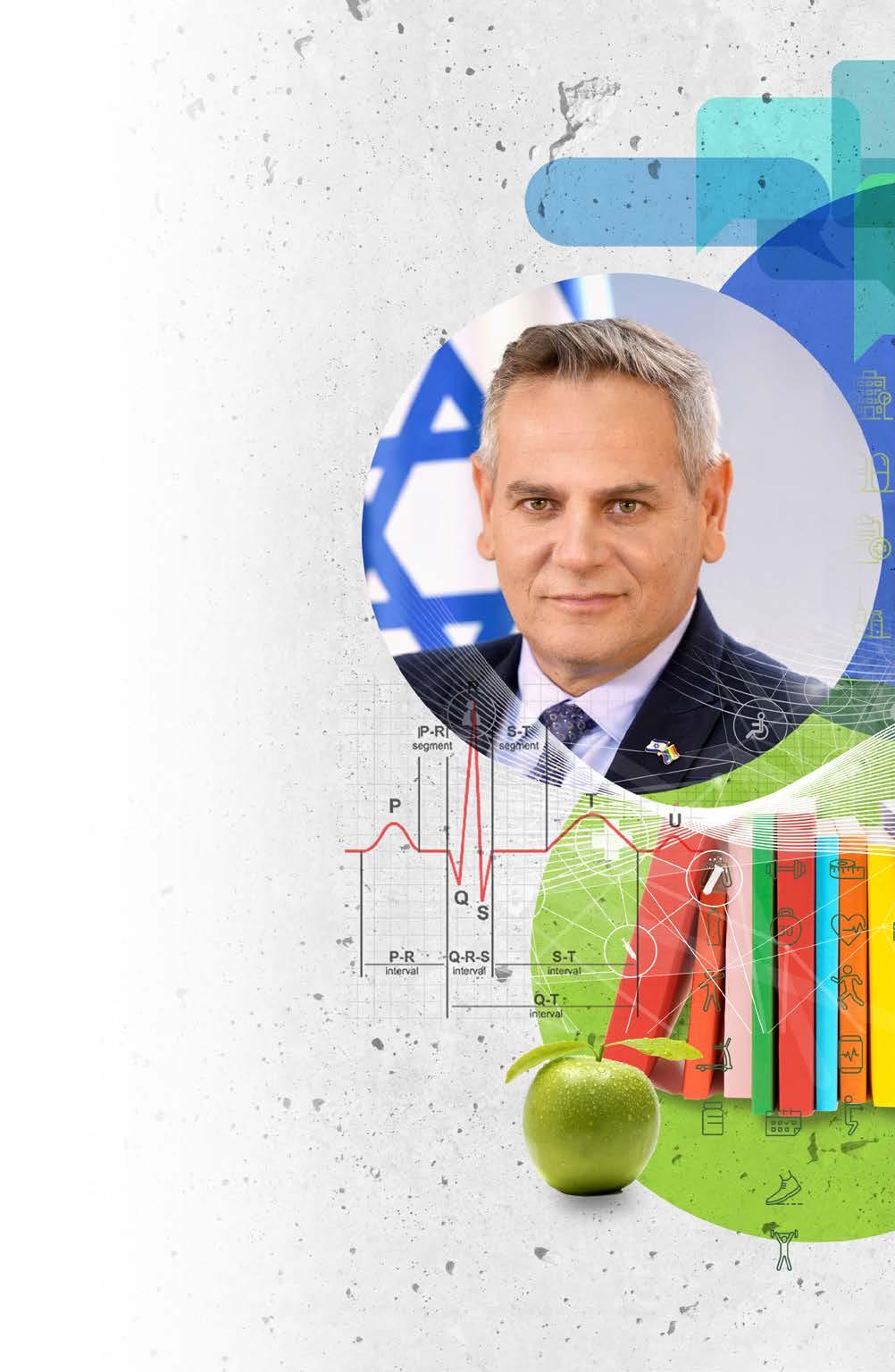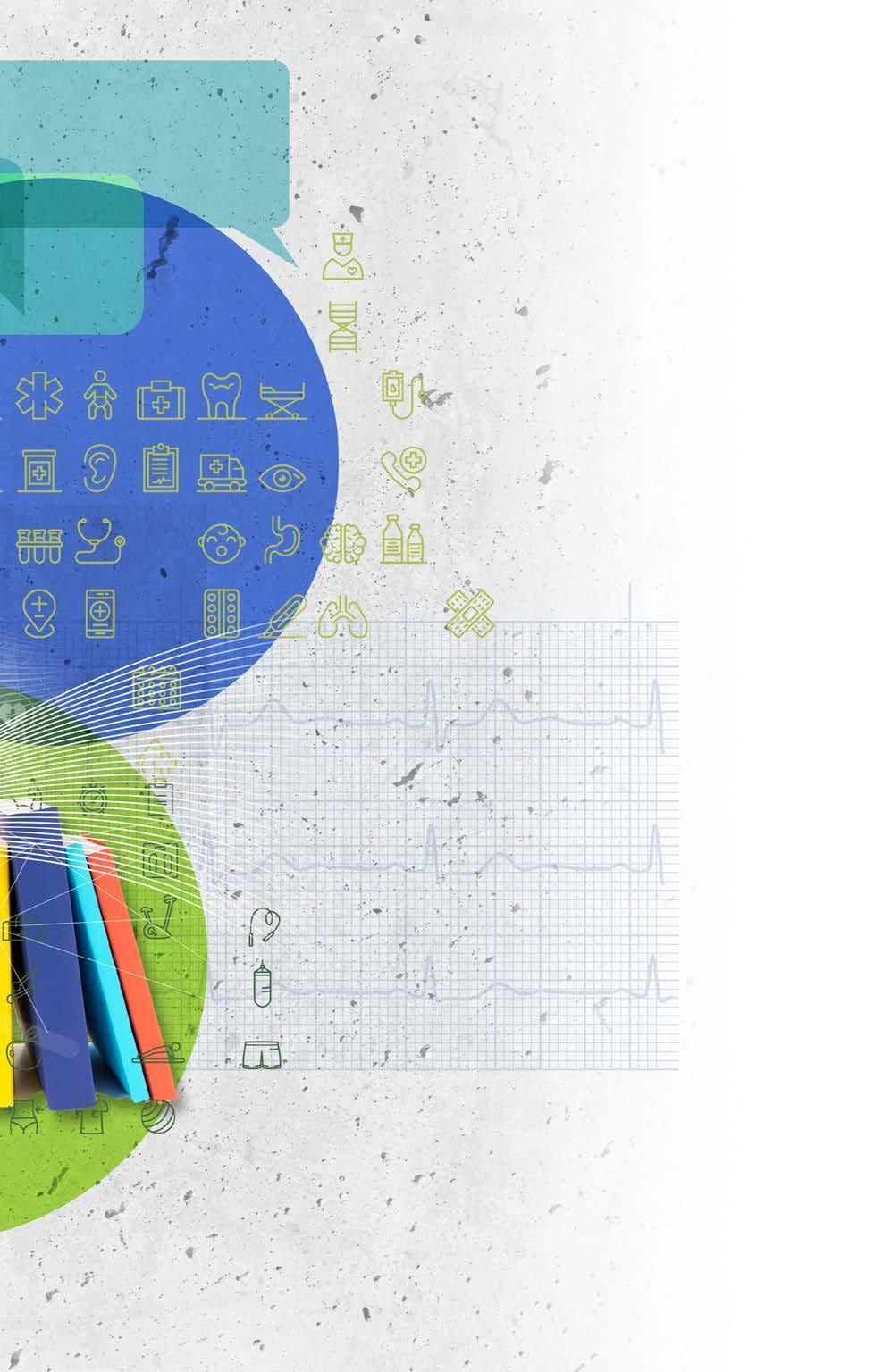
10 minute read
Reports, cont. | pp
Legal Clinics: "Their Work Lifted My Soul"
The Clinic for the Rights of Holocaust Survivors and the Elderly at TAU’s Buchmann Faculty of Law helped a 77-year-old Tel Aviv woman win a significant legal battle over her public housing apartment. Under the guidance of clinical instructors Liad Strolov and Yael Havassy-Aharoni, the TAU team overturned an eviction and rent hike notice that Katlin Bidel (pictured) received. Furthermore, the pro-bono work of the Clinic – which receives support from the Netzach Israel Foundation – led to a complete renovation of the hazardous living conditions at Bidel's residence. “The work of the students, staff and attorneys from Tel Aviv University completely changed my life,” said Bidel, the daughter of Holocaust survivors and a diabetes patient, who herself escaped communist Hungary to Israel in 1971. “The Legal Clinic helped me in every way possible and their work lifted my soul. I’m grateful a thousand times over.”
Added challenges of transitioning to adulthood
Dr. Yafit Sulimani Aidan (Social Sciences) of the Bob Shapell School of Social Work was awarded an ISF grant for her research on the transition to adulthood among young at-risk Arabs in Israel. With the aim of producing a context-based theoretical model, she is studying the effect of intertwined social influences, such as political, cultural and inter-personal dynamics, combined with the youths’ personal experiences of risk and resilience. With the understanding that emerging resilience during this challenging stage provides a window of opportunity for positive change, especially for youth at risk, her research aims to inform interventions and policy.

Leveling the playing field through occupational therapy
A program for Community-Based Occupational Therapy, created by Prof. Navah Ratzon (Medicine) and managed by research assistant Sarah Gat, has recently been adopted. Some 40 occupational therapy students at the Stanley Steyer School of Health Professions are integrated into community locales in cooperation with organizations such as Mesila, a Tel Aviv municipality center for migrant workers and refugees. These sites are chosen for their ability to give students experience in needs assessment, program planning, outcome evaluation, and implementation of various research methodologies. In addition to providing students with the important experience of clinical fieldwork, the program aims to promote occupational justice among disadvantaged communities.
COMMUNITY
TAU on VOD
Student films coming out of the Steve Tisch School of Film and Television – which celebrates its 50th anniversary this year – have long been winning awards in Israel and around the world. Now these industry-leading productions can be viewed on a new streaming channel using the T-Port platform. Developed by TAU alumni, T-Port is a first-of-itskind online platform showcasing film creations from the finest film schools across the world, and connecting new talent with the film industry. T-Port's new channel offers a unique, free VOD service for TAU's film students and for Friends of TAU around the world, with content updated regularly.
From TAU to Google: Helping victims of domestic abuse
Motivated by a course of the “TAU Impact” program for community responsibility, TAU alumna Yuval Karni led the rollout of an automated Google hotline for victims of domestic violence. Upon graduation from the Buchmann Faculty of Law, Karni began a job at Google where she applied her knowledge from TAU to orchestrate development of the online tool. It is now operational in the US, Australia and Israel in English, Hebrew and Arabic. The tool works by providing a pop-up with emergency contact information when a person’s Google searches indicate they are facing domestic violence. “The goal is to provide constructive help for people when they need it most,” says Karni. In a collaborative study involving Israel, the UK, Spain and Greece, Prof. Lilach Shalev-Mevorah (Humanities) of the Jaime and Joan Constantiner School of Education, alongside international colleagues, showed that attention skills are a major challenge for many children with autism, and that attention training positively affects their performance. Research also showed teachers' low confidence regarding knowledge of attention difficulties in autism. The Teacher Training and Attention in Autism project was therefore established with the aim of extending teachers' theoretical and practical knowledge of the problem, and providing them with online tools developed in Shalev-Mevorah’s lab.
Software engineers – Not what you expected
Dr. Amir Rubinstein (Exact Sciences) of the Blavatnik School of Computer Science serves as academic advisor to a high-tech program offered to female Ultra-Orthodox seminary students. The Adva Program, an initiative of the Start-Up Nation Central Foundation, offers a twoyear vocational computer science course designed in partnership with high-tech companies and leading universities. The women learn core mathematical and computational skills, take part in advanced programming training projects, and receive ongoing mentoring in preparation for the high-tech recruiting process. The goal is to produce a crop of software engineers who will bring much-needed income into the Ultra-Orthodox community.
Fighting for the right to be heard
Aya Wertheimer, an alumna of the Bob Shapell School of Social Work with a graduate degree in policy and human rights, together with her NGO partners, led the struggle for recognition of women's suffering due to endometriosis. Long dismissed as "female sensitivity,” this is now a recognized medical condition, meaning that affected women can receive state assistance and subsidized medication for alleviating the condition. Hailed by Women of the Year 2020 as one of Israel's leading feminists, Wertheimer is co-founder/co-CEO of the Endometriosis Israel NGO, and says that the study program at TAU gave her the courage to establish the organization.
The digital transformation of healthcare
ICU4COVID, a European-funded consortium, aims to develop safe clinical treatment in intensive care units during a pandemic. A team led by Dr. Tal Soffer (Humanities), Head of the Technology and Society Foresight (TSF) Unit at the Jaime and Joan Constantiner School of Education, is playing a major part in introducing cutting-edge digital telehealth procedures that keep both patients and healthcare workers safe. Proposed solutions will use artificial intelligence to empower healthcare workers with medical, economic and organizational datadriven prediction models. TSF also advocates for taking issues of privacy, cyber security and ethics into account. According to Dr. Soffer, "Successful digital transformation needs a person-centered approach."
In what surroundings do we learn better?
Among the many changes wrought by the COVID pandemic are those affecting the learning environment, with virtual spaces replacing physical ones and outdoor spaces replacing classrooms. With a grant from the TAU Center for Combating Pandemics, Prof. Miri Yemini (Humanities) of the Jaime and Joan Constantiner School of Education and Dr. Efrat Blumenfeld-Lieberthal (Arts) of the David Azrieli School of Architecture examined the effects of learning spaces on children's learning. Focusing on two neighborhoods in Tel Aviv-Jaffa, and comparing quality of outdoor spaces, preliminary findings showed that schools in lower socio-economic areas succeeded beyond expectations, indicating that school leadership for effective use of urban space can have a significant effect on outcome.
Pregnancy and the COVID vaccine
Pregnant women were excluded from the Pfizer vaccine clinical trials, leaving questions about vaccine use for this group. Providing the first definitive answer, statisticians Prof. Malka Gorfine, Dr. Daniel Nevo and Prof. David Steinberg (all from Exact Sciences) collaborated with Dr. Inbal Goldshtein of Maccabi Healthcare Services, comparing a matched group of vaccinated and non-vaccinated pregnant women. Results showed a significantly lower risk of COVID-19 infection in the vaccinated group, with no evidence of adverse effects. A further joint study attested to no harm among infants, while a collaboration with the Gertner Institute and Ministry of Health is developing machine learning-based models for weekly COVID-19 outcome predictions.
Steering Israel through COVID-19
From the benches of Israel’s parliamentary opposition to a seat in the current government, TAU alumnus Nitzan Horowitz’s career trajectory has skyrocketed since his time as a student at TAU’s Buchmann Faculty of Law. As Israel’s Minister of Health he has served an instrumental role in guiding the country’s COVID-19 pandemic response since 2021. “My experience studying at TAU gave me a broad understanding of the world of law, society and government,” he says. “Studying at TAU sets a high standard for those who want to advance further to different influential positions.” Before his rise in politics, Horowitz had a two decade-long career in journalism. He engaged in efforts to advance social justice and served as a board member of the Association for Civil Rights in Israel. In 2009, he was elected to Knesset as a member of the then-opposition Meretz party. Until his ministerial appointment last year, Horowitz served three separate Knesset terms during which he initiated dozens of bills focused on social issues, religion and state, education and culture, environmental reforms, animal protection and LGBT rights.

Has lockdown been a pain?
According to Dr. Alona Emodi-Perlman and Prof. Ilana Eli (both from Medicine) of the Maurice and Gabriela Goldschleger School of Dental Medicine, the answer is quite literally, yes. In a collaborative study with researchers in Poland, they discovered a significantly increased incidence of facial and jaw pain resulting from tension induced jaw-clenching and teeth-grinding. The condition was particularly prevalent among the 35-55 age group, especially women, reflecting their worry over income, difficult work conditions, childcare, and elderly parents during the pandemic.
The health-economy dilemma
Dr. Bruria Adini (Medicine) and Dr. Amiram Moshaiov (Engineering), together with computer scientists from the Otto-von-Guericke University Magdeburg, Germany, conducted research on the dilemma of health versus the economy during the pandemic. Their study indicates that optimal timing for interventions such as social distancing and lockdowns is essential for maintaining economic prosperity as well as public health. They suggest that a holistic approach considering both aspects is vital for the effective management of pandemics.

New practices for new times
Adjusting to the ubiquitous pandemic restrictions, occupational therapy expert Prof. Debbie Rand (Medicine) of the Stanley Steyer School of Health Professions, in cooperation with colleagues from Hebrew and Haifa Universities, developed an MA course on "TeleTreatment in the Health Professions.” Presented over Zoom to MA students from the three universities, the course imparts novel techniques for “tele-OT,” occupational therapy over the phone, allowing the provision of services such as assessment, consultation and intervention to those in need, while abiding by Corona constraints.
Safety precaution or breach of privacy?
The Ministry of Health's contact tracing application (HaMagen), meant to discover who was near an infected person, raised privacy concerns. Prof. Michael Birnhack (Law), an expert on privacy law, acted as advisor to the Ministry. Among his suggestions was the simplification of language on the consent form, its presentation in numerous languages, and prohibition of certain secondary uses of the data. Based on his advice, changes were made to the application, which received his public endorsement.
Children under lockdown
A recognized leader in child abuse prevention, Prof. Carmit Katz (Social Sciences) of the Bob Shapell School of Social Work gathered some 20 colleagues from over 15 countries into an international group stewarding policy change for child protection during the pandemic. The group's latest research project spotlighted the worrisome decrease in child maltreatment reports during lockdowns, when children were more vulnerable and out of the public gaze, illustrating the urgent need to develop innovative strategies to protect children in times of worldwide crisis.
Politics and pandemics
As a part of the Pandemics and Politics Project, Prof. Udi Sommer (Social Sciences) and PhD student Or Rappel-Kroyzer (Humanities) of the Zvi Yavetz School of Historical Studies are quantifying the relationship between COVID-19 and political processes in the USA and beyond. They examine how COVID-19 influenced the 2020 US presidential elections, how politics in the form of ideology, gender, race and partisanship influenced the pandemic, and how the nature of emergency politics changed in the Corona era. Using statistical methods and natural language processing algorithms on data collected from various websites, such as the CDC and New York Times, they also study the relation between media coverage of COVID-19 and how various democracies have coped with the outbreak.
Genetic data informs healthcare policy
PhD candidate Danielle Miller and Prof. Adi Stern (both from Life Sciences) of the Shmunis School of Biomedicine and Cancer Research led an international team that was among the first to trace the origins and dynamics of COVID-19. Miller, one of dozens of Azrieli Fellows at TAU in recent years, sequenced the genome of SARS-CoV-2 and identified 224 viral mutations among patients in Israel during the first wave of infection. The findings enabled quick and effective policymaking, such as institutional social distancing to prevent viral spread. "Being an Azrieli Fellow provides the atmosphere every scientist needs to thrive,” said Miller, who is now using artificial intelligence to better understand microorganisms, another path for enhancing clinical and biotechnological applications.



